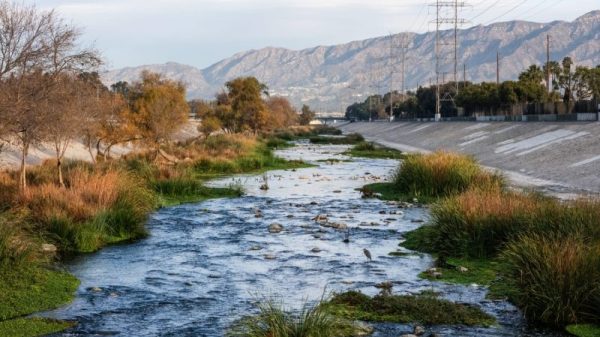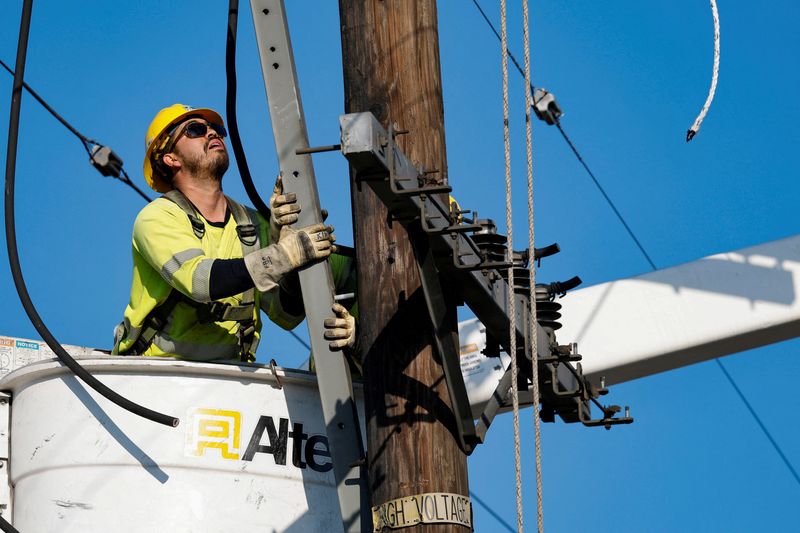By Tim McLaughlin and Laila Kearney
(Reuters) – President Donald Trump’s oversight of an increasingly unreliable U.S. power grid requires swift action, he said this week, but there is no easy fix for one of the grid’s most complex and troubled areas: long-distance transmission lines.
Trump’s National Energy Emergency declaration and executive orders detail a long list of interconnected problems dogging an electric grid vulnerable to fuel shortages, soaring demand, and an increasing number of wild weather events.
“There’s clearly a recognition of the need to increase energy production broadly in the United States and do it with whatever resources necessary,” said Spencer Pederson, a top executive at the National Electrical Manufacturers Association.
Trump’s initial moves could help to some degree: The emergency declaration directs agencies to scour their books for laws and regulations that could be used to speed approval and permitting for projects like transmission, and overcome regulatory obstacles that have long hampered big projects.
The executive orders, part of a slew of actions Trump signed his first day in office to accelerate broader energy production, seek to streamline permitting procedures that historically have taken years or even decades.
Morgan Stanley (NYSE:MS), in a note this week to investors, said Trump’s actions “could improve the speed of transmission infrastructure permitting and environmental reviews.”
Big obstacles remain. Pederson noted a shortage of large electrical transformers and skilled workers, and added that the U.S. grid’s overseas supply chain is still adjusting to being reoriented away from China, a move that began during the first Trump administration.
Also, some doubt that Trump’s executive actions can penetrate an entrenched web of local, state and regional regulators who have strong political incentives to hold down spending for electric customers, said Kent Chandler, a former chairman of Kentucky’s Public Service Commission who teaches a class on public utility regulation at Yale Law School.
Power lines spanning multiple states have been repeatedly blocked due to broad local resistance to what some view as unsightly or environmentally worrisome infrastructure projects.
Shon Hiatt, Director of USC Marshall’s Business of Energy Transition initiative, said Trump’s emergency declaration could prove useful for speeding up transmission projects on public lands, but that overcoming local and state actors could require an Act of Congress.
“It’s not like there’s public lands going across the entire country where this needs to happen,” Hiatt said.
DATACENTER BOOM
The grid’s vulnerability has intensified since Trump’s first term, with booming power demand from datacenters for artificial intelligence and cryptocurrency along with manufacturing and EV adoption, utility executives, regulators and trade groups say.
The grid’s capacity of long-distance transmission lines would need to quintuple over the next decade to handle that big surge in power demand outlined in the U.S. Energy Department’s latest state of the grid report.
“The clear message from (Trump) is that it’s time to really put a heavier foot on the gas pedal and get things moving,” said Larry Gasteiger, executive director of WIRES, a trade association for transmission line companies.
Making that happen would be good news not just for fossil fuel-fired power, but also for hundreds of renewable energy projects – like solar and wind farms – that have struggled for access to the grid.
Christina Hayes, executive director of Americans for a Clean Energy Grid, said one of the most promising parts of Trump’s executive order, titled Unleashing American Energy, is a directive to develop recommendations for Congress for interstate energy infrastructure.
She said that “could potentially lead to meaningful reforms in siting and permitting procedures.”
“Western states are likely to see the most immediate impact from these changes, given the concentration of federal lands in the region,” Hayes said.
Catie Hausman, a University of Michigan economics professor, has studied how some public utilities have blocked transmission buildout for renewables to protect the economic viability of their incumbent gas and coal power plants. She does not expect Trump’s executive actions to make those turf battles disappear.
“There have been so many impediments to building long-distance transmission lines,” Hausman said. “It’s hard to even know where to start.”






























